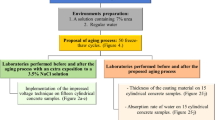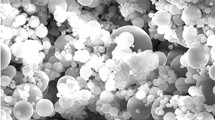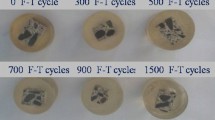Abstract
IT is known that incorrect estimates of the modulus of rupture and tensile strength may be obtained if Portland cement mortar or concrete specimens awaiting test are allowed to dry partially. Strength changes have also been observed when pozzolana-lime cement specimens begin to dry out1, and, similarly, it has been demonstrated2 that temporary reductions can develop in the modulus of rupture of road-making concretes, over a period of days, if the hardened mass is subjected to drying conditions.
This is a preview of subscription content, access via your institution
Access options
Subscribe to this journal
Receive 51 print issues and online access
$199.00 per year
only $3.90 per issue
Buy this article
- Purchase on Springer Link
- Instant access to full article PDF
Prices may be subject to local taxes which are calculated during checkout
Similar content being viewed by others
References
Alexander, K. M., and Wardlaw, J., Austral. J. App. Sci., 6 (1), 46 (1955).
Graf, O., Strassenbautagung, 157 (1938).
Author information
Authors and Affiliations
Rights and permissions
About this article
Cite this article
ALEXANDER, K. Errors caused by Partial Drying of Hardened Portland Cement during Testing. Nature 183, 885–886 (1959). https://doi.org/10.1038/183885a0
Issue Date:
DOI: https://doi.org/10.1038/183885a0
This article is cited by
-
Reply to 'Comments ?On the factors affecting strength of Portland cement?'
Journal of Materials Science (1985)
-
On the factors affecting strength of portland cement
Journal of Materials Science (1984)
-
Fracture measurements on cement paste
Journal of Materials Science (1976)
-
Fracture measurements on cement paste
Journal of Materials Science (1976)
-
Bestimmung von Lecithin und Colaminkephalin in pharmazeutischen Präparaten
Fresenius' Zeitschrift für analytische Chemie (1963)
Comments
By submitting a comment you agree to abide by our Terms and Community Guidelines. If you find something abusive or that does not comply with our terms or guidelines please flag it as inappropriate.



